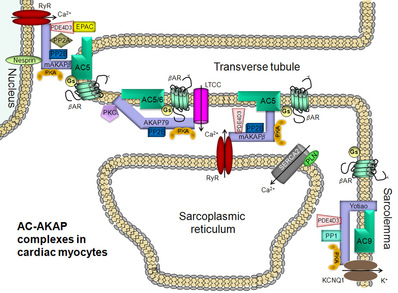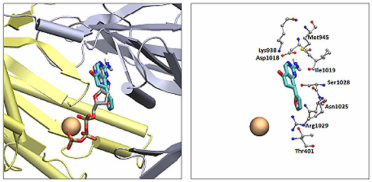Research
Adenylyl Cyclase/cyclic AMP Regulation of Heart

Adenylyl Cyclase/cyclic AMP Regulation of Heart
The cyclic AMP (cAMP) pathway has key physiological effects on heart function and is essential for the chronotropic, inotropic, and lusitropic effects during the ‘fight-or-flight’ response. However, chronic activation of the cAMP pathway induces hypertrophic growth and ventricular dysfunction, which ultimately leads to the development of chamber dilatation and heart failure. Our laboratory has identified multiple AKAP-AC complexes in cardiac myocytes that contribute to the temporal and spatial regulation of cAMP signal output. Disruption of PKA anchoring in cardiac myocytes results in impaired cAMP regulation of channels, the phosphorylation of PKA targets, and altered cardiac contraction in heart. Moreover, we have shown that disruption of mAKAP-AC5 complexes in cardiac myocytes results in increased cAMP and hypertrophy in the absence of agonist stimulation. Similarly, disruption of the Yotiao-AC9-IKs complex alters the phosphorylation of the IKs channel subunit, KCNQ1 that is important for cardiac repolarization. Human mutations in Yotiao and/or KCNQ1 that disrupt complex formation give rise to long QT syndrome and cardiac arrythmias. Our work suggests that anchoring of AC to specific effectors is a major contributor to cAMP sensitivity and compartmentalization. Current projects utilize primary neonatal and adult cardiac myocytes along with proteomics and sophisticated imaging techniques to further delineate the role of AC complexes in cardiac physiology and pathophysiology.
Adenylyl Cyclase/cAMP Regulation of Chronic Pain Pathways

Adenylyl Cyclase/cAMP Regulation of Chronic Pain Pathways
At least half of all spinal cord injury (SCI) patients endure life-long chronic pain that resists available treatments. Activity in the cAMP-PKA pathway in DRG neurons has been implicated in long-lasting hypersensitivity and pain . We are working to define cAMP-regulated signaling complexes in dorsal root ganglia that maintain nociceptor hyperexcitability and thus a chronic pain state after SCI. We are also working to determine the mechanisms for opioid insensitivity after SCI.
G protein Regulation of Adenylyl Cyclase Isoforms: Searching for AC Selective Inhibitors

G protein Regulation of Adenylyl Cyclase Isoforms
Our laboratory has long been interested in characterizing the regulatory mechanisms of adenylyl cyclase (AC) by G protein alpha and beta-gamma subunits, protein kinases, and A-kinase anchoring proteins. Towards this end, we express full-length AC isoforms in Sf9 cells and purify and reconstitute purified cytosolic AC domains as tools to biochemically characterize these enzymes. More recently, we have been screening for unique AC-isoform selective inhibitors using computational and high-throughput methods.